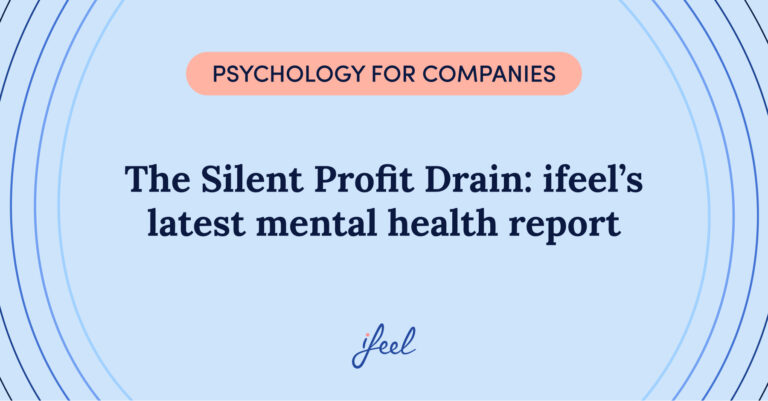Today, companies are not only looking to maximise their profits, but also to operate in a sustainable, ethical and socially responsible manner. In this context, ESG criteria (Environmental, Social and Governance) represent the standard for measuring the environmental, social and governance impact of organisations, responding to growing demands from consumers, investors and employees.
But did you know that implementing these criteria can improve corporate reputation and generate significant cost savings?
It’s true. Beyond being an ethical commitment, integrating ESG criteria is a smart business strategy. These practices not only help manage risk and optimise resources, but also generate tangible benefits, such as reduced operating costs and improved talent retention.
This article will explore how companies that adopt ESG criteria can optimise their operations, reduce risks and ultimately save money. In addition, we will look at how solutions such as those offered by ifeel, which focus on employee mental well-being, can be a key pillar of an effective ESG strategy.
What are ESG criteria?
ESG criteria, which stands for Environmental, Social, and Governance, are a set of standards that assess how a company manages its impact in three key areas: the environment, society, and corporate governance.
These criteria are not only relevant to investors, but also to employees, customers, and business partners, as they reflect an organisation’s commitment to sustainability and social responsibility.
- Environmental (E): Includes carbon emissions management, energy efficiency, use of natural resources and sustainability policies.
- Social (S): Focuses on diversity, inclusion, occupational health and safety, and community relations.
- Corporate governance (G): Assesses transparency, business ethics, board composition and risk management.
Cost savings through ESG criteria
Adopting ESG criteria not only responds to legal obligations or social demands but also has a direct impact on cost optimization and company financial sustainability.
By addressing key aspects such as the environment, society and governance, organisations can improve their operational efficiency, strengthen employee engagement and optimise their bottom line. Below, we explore how ESG criteria generate tangible savings:
1. Lower capital costs:
According to studies, companies with higher ESG scores are perceived as less risky and more sustainable by financial markets. This allows them to access financing on more favourable terms, such as lower interest rates or greater willingness on the part of investors to support their projects.
This benefit, linked to perceptions of responsibility and sustainability, significantly reduces the costs associated with loans, bond issuance, and capital raising.
2. Reduced operating costs
Implementing sustainable practices, such as energy efficiency or proper waste management, can significantly reduce operating expenses. For example, the use of renewable energy not only reduces the carbon footprint, but also generates long-term savings in energy costs. This approach not only benefits the environment, but also improves the profitability of daily operations.
3. Lower employee turnover and absenteeism
The social criteria of ESG places a strong emphasis on employee well-being, which translates into lower turnover and absenteeism. Companies that prioritise mental health and well-being in the workplace not only increase the satisfaction of their teams, but also reduce the costs associated with hiring and training new employees.
Companies that invest in mental well-being programmes not only meet these standards, but also reap significant financial benefits. For example, solutions such as those offered by ifeel help companies identify and mitigate risks related to stress and burnout, achieving a 30% reduction in sick leave related to psychological issues.
In addition, mentally healthy employees are more productive, which has a positive impact on financial results. This approach not only improves productivity, but can also save between £15,000 and £50,000 for each high-risk employee who avoids a prolonged absence. By prioritising mental health, companies not only strengthen their commitment to ESG criteria, but also optimise their operational and financial performance.
4. Risk management and regulatory compliance
The governance criterion ensures that companies operate ethically and transparently, significantly reducing the risk of legal sanctions and reputational damage. This is especially critical in highly regulated sectors, where non-compliance can result in fines running into millions.
One example is the implementation of financial transparency policies, which ensure regulatory compliance and build trust among investors and shareholders, strengthening the organisation’s financial stability.
Implementing ESG criteria: Key steps
A structured approach is essential to ensuring that your company complies with ESG criteria effectively and sustainably. Below, we explain the key steps to implement these practices and maximise their impact on your organisation.
1. Initial assessment
The first step is to assess the company’s current performance against each of the ESG criteria. This includes measuring its carbon footprint, analysing its diversity policies and reviewing its governance structure.
2. Setting objectives
Once areas for improvement have been identified, it is crucial to set clear and measurable objectives. For example, reducing carbon emissions by 20% in three years or implementing a mental health programme for all employees.
3. Developing an action plan
This plan should include specific policies, resource allocation and metrics to measure progress. In the case of employee wellbeing, solutions such as those offered by ifeel can be easily integrated into action plans, delivering measurable results in less than six months.
4. Monitoring and optimisation
The use of analytics tools and dashboards allows companies to monitor their progress in real time and adjust their strategies as necessary.
ifeel: A strategic ally in the implementation of ESG criteria
ifeel not only helps companies comply with ESG criteria, but also has a direct impact on the bottom line. Its data-driven approach and ability to deliver customised solutions make it an indispensable tool for organisations seeking to be socially responsible and financially efficient.
| Key Benefit | Description |
|---|---|
| Cost reduction | Up to 50% in sick leave-related expenses. |
| Measurable impact | Real-time dashboards showing the ROI of wellness initiatives. |
| Scalability | Solutions tailored to companies with more than 10,000 employees. |
Mental health at work, one of the biggest challenges facing businesses today
Adopting ESG criteria is not just a matter of social responsibility; it is a business strategy that can generate significant savings and improve long-term sustainability. By integrating these standards into their business model, companies have much to gain, from reducing operating costs to improving employee well-being.
Solutions such as those offered by ifeel not only facilitate this transition, but also guarantee measurable results, helping organisations to become more competitive and responsible. Are you ready to take the next step towards a more sustainable and profitable future?











